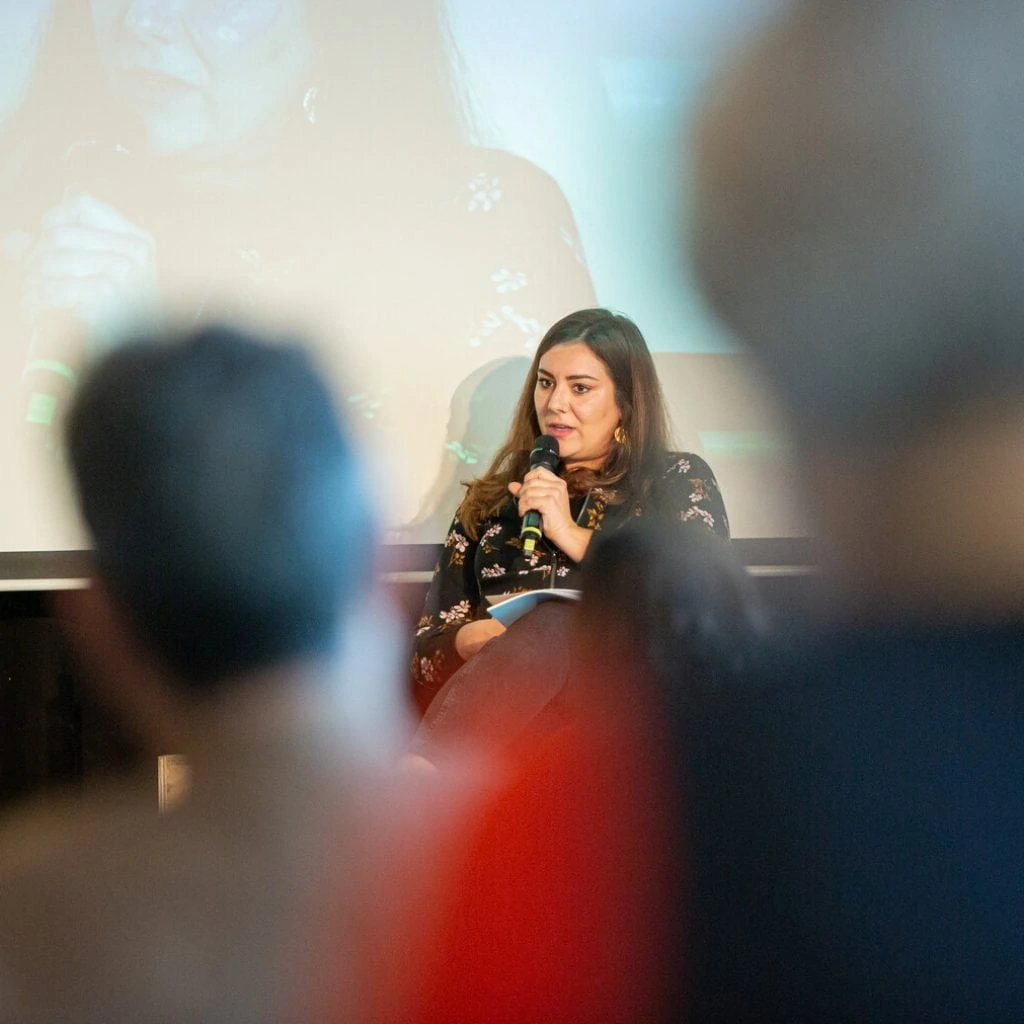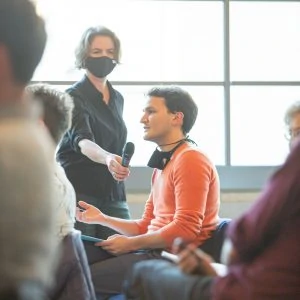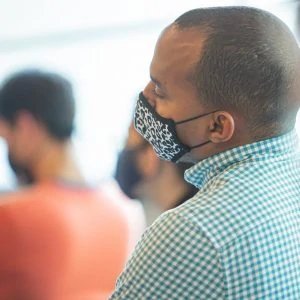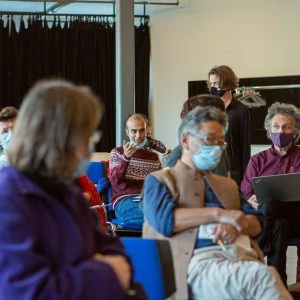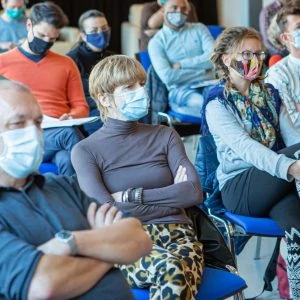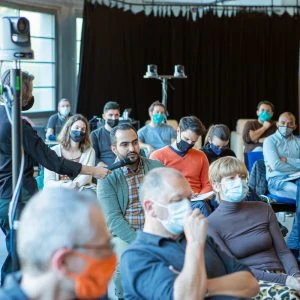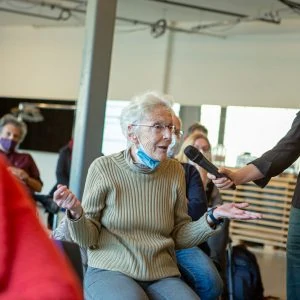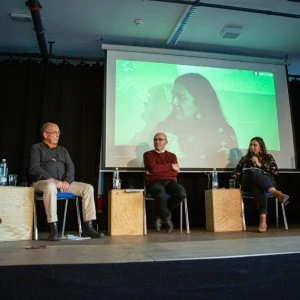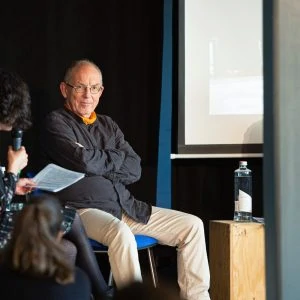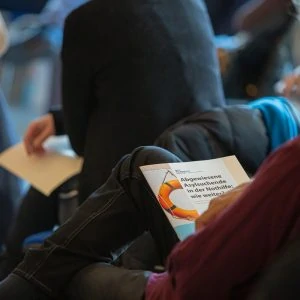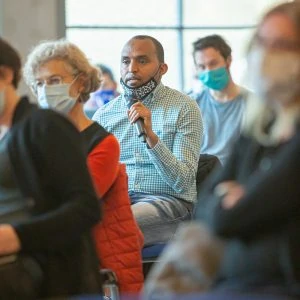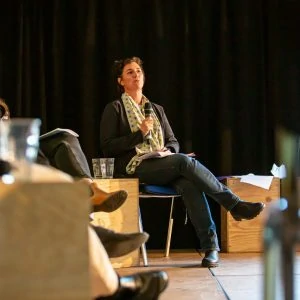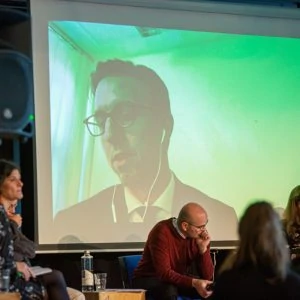What are good solutions for people with legally rejected asylum applications in emergency aid? Five experts from politics, authorities and civil society discussed this question on 11 November in Basel at the invitation of terre des hommes schweiz. The report of the event with video live streaming.
People often flee from war, violence and poverty. If their application for asylum is rejected and they have a legally valid removal order, they must leave Switzerland according to the law. However, many do not do so and some cannot do so because they come from countries with "enforcement difficulties" such as Eritrea, China, Tibet and Algeria.
"Some are 'parked' for years and remain in a precarious dependency on the state," said Sylvia Valentin of terre des hommes schweiz at the beginning of the panel discussion entitled "Asylum seekers turned away in emergency aid: what next? "Emergency aid prevents integration", said the person responsible for migration issues at the development organisation.
The event on the emergency aid regime
At the invitation of terre des hommes schweiz, five personalities from politics, authorities and civil society discussed possible good solutions for asylum seekers with negative decisions in emergency aid on 11 November 2020 in the Salon of the Markthalle Basel: Dieter von Blarer, Jana Häberlein, Claudio Martelli, Samira Marti and Andreas Räss. The basis was a Report on the situation of people receiving emergency aid (PDF) in Switzerland with a focus on the situation in the cantons of Basel-Stadt and Basel-Landschaft. It was written by the social scientist Jana Häberlein for terre des hommes schweiz.
Since 2008, rejected asylum-seekers have only received emergency aid and no longer emergency social asylum assistance. According to the Federal Constitution, the minimum resources that are indispensable for a "humane existence" should be made available, i.e. at a much lower level than social assistance and asylum social assistance. Food, clothing, hygiene articles, basic medical care or shelter are considered indispensable.
In 2019, according to the State Secretariat for Migration (SEM), 6784 persons with a negative asylum decision received emergency aid in Switzerland. In the fourth quarter of 2019, 2272 persons belonged to the long-term emergency aid recipients (LAB), which one becomes after a reference year.
The report of terre des hommes switzerland
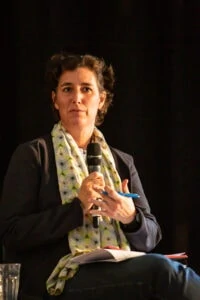
and lecturer, author of studies
"It is almost impossible to live a life in dignity with emergency aid," said the author of the study Jana Häberlein at the event. The system had been designed as a "short-term measure" - and meant for "thousands of people a persistence under inhumane conditions, for years".
The 36-page report highlights the emergency aid system in the BS and BL, taking into account the situation in Switzerland as a whole, and focusing on the issues of shelter or housing, education and employment. The author has also spoken with the people affected herself and with professionals who work in asylum centres, for example.
In Switzerland there is no uniform standard for the accommodation of people receiving emergency aid. They live in collective accommodation and apartments, with host families or in the emergency shelter. "Better accommodation conditions are needed where there are no national minimum standards," says Jana Häberlein. In Basel-Stadt, for example, there should be no accommodation in emergency shelters, and in Baselland, she recommends expanding accommodation in asylum apartments, especially for children and their families.
Pursuing gainful employment is generally prohibited under the Swiss Aliens Act. "Long-term emergency aid recipients must be granted access to the legal labour market," said Jana Häberlein, who also based her statement on a 2019 study by the Federal Migration Commission (EKM).
As a result of the ban on work, rejected asylum seekers often receive emergency aid for years, which means an "unforeseeable period of waiting" for them and causes costs for the state, she explained: "This waste of human capital and individual life plans must be clearly criticised from a health, human rights, social and economic perspective". If people remain in long-term emergency aid because they cannot return to their country of origin, they should urgently be given the chance to participate in the labour market, she said.
The topics of the panel discussion
In the panel discussion led by moderator Inés Mateos, the first part of the discussion focused on the discretionary scope between law and reality, and the second part on politics.
The topic of (gainful) employment and occupation, the often gruelling time of waiting in the long-term emergency aid (LAB) until the hardship case regulation for people from the asylum sector after five years of residence in Switzerland, provided a lively discussion topic. It was also about access to integration and the proof of identity, the "dilemma" between enforcement and individual case monitoring, and the "to and fro" between the cantons and the federal administration, a peculiarity of the federal system in Switzerland.
The votes of the podium guests
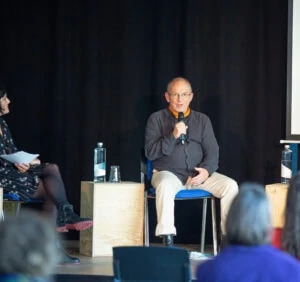
Dieter von Blarer is a lawyer in the field of migration and president of Humanrights.ch. He knows from his own experience that when asylum seekers are given access to a job, for example an internship, in an exceptional procedure, "their self-confidence changes massively", he said. Unstructured unemployment" does not strengthen asylum seekers in emergency aid and prevents their integration. However, it is a prerequisite for the approval of a hardship application, Dieter von Blarer said: "How far can you go to keep people away from the workplace in order to enforce migration law issues of the state? And when do the human rights of individuals begin to take effect, namely that they should have access to work?" For him it's clear: "It's strategically wrong to link immigration policy to labour policy."
"For a hardship grant, the question of identity must be clarified," said Claudio MartelliDeputy Director SEM and Head of the Asylum Directorate. He showed understanding for the fact that the people concerned were in a difficult situation. According to Claudio Martelli, the SEM has the role of a legislator who examines the hardship applications of rejected asylum seekers "with care". However, if people do not cooperate in establishing their identity, for example by not trying to obtain their identity papers from their country's embassy, the application cannot be granted, even if the SEM is aware that this has "a major impact on those concerned," he said.
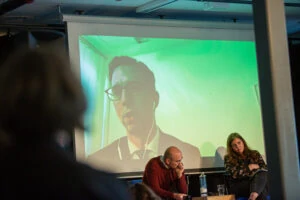
Deputy Director SEM, Head of the Asylum Directorate
"Execution is ultimately a matter for the cantons," Andreas RässHead of the Basel-Land Office for Migration and Civil Rights. Each case presents itself differently. In BL, individual case examination was the order of the day and the company was therefore in the comfortable position of knowing all those involved. "We cannot move freely, however, but there are framework conditions set by the federal government, the courts and politicians", said Andreas Räss. He spoke of a "dilemma" for a cantonal authority: "On the one hand, we want to ensure good integration and, on the other hand, we should make the stay as unattractive as possible for rejected asylum seekers and then still expect the people to be well integrated for the settlement".
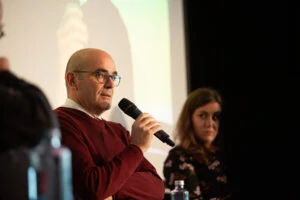
Head of Migration Office
and civil rights BL
He reported that over 80 percent of the hardship applications submitted to the SEM by the canton of BL were approved. The statutory five years before one can submit a hardship case application in Bern is a "very long time, especially for children and young people in education", Andreas Räss said. In Baselland, he said, it is therefore much quicker to file a hardship petition when children are affected "because here the future perspective is decisive": "Young people stay here for a long time and should also have a chance to use their lives constructively.
Finally, the SP National Councillor Samira Marti...an economist by profession. Emergency aid was "a dead end" and conceived as a temporary solution. "We must not write laws that do not work in reality," she said, referring to those who receive long-term emergency aid. "It is inadmissible to link labour law with social policy," she said. She therefore expects legislators to make adjustments.

It was not acceptable to "lump all people together" in the hardship cases, she said to the SEM. Every single case must be examined. "If we realize after 15 years of emergency aid regimes that it does not work for most people and deportations cannot be implemented, it is necessary that the number of hardship applications must increase", said the left-wing parliamentarian. Anything else would be a "correction of legislation by the federal administration". "There is still much to be done", she concluded.
Solution approaches with Reality Check
Sylvia Valentin of terre des hommes schweiz concluded the stimulating panel discussion with the remark that the report and the event showed: "There are approaches to solutions that can improve the situation of those affected. This requires the will of all those involved, she said, "and the systematic reality check to ensure that rejected asylum seekers in emergency aid are actually granted the humane existence to which they are legally entitled".
What we demand
"Asylum seekers in emergency aid should be able to do gainful employment, attend school or do an apprenticeship and live in decent accommodation," says Sylvia Valentin, migration officer at terre des hommes schweiz.
terre des hommes switzerland demands:
- Solutions are needed which enable those affected to live in dignity and which make more sense in socio-political and economic terms than the current system.
- Pragmatic solutions must be found quickly within the existing legal possibilities. In the longer term, however, a change in the legal requirements is desirable.
- The system of emergency aid must be in line with the reality of the people who receive it.
- The basic attitude towards rejected asylum seekers in emergency aid must change.

